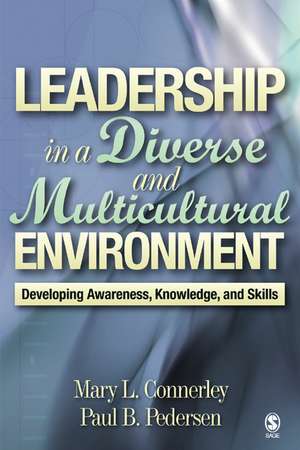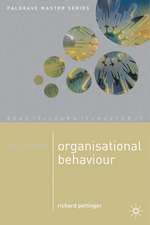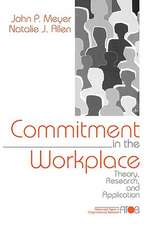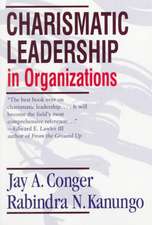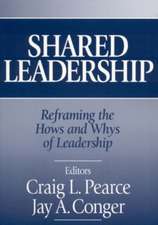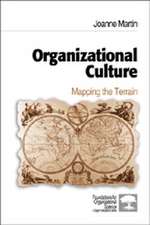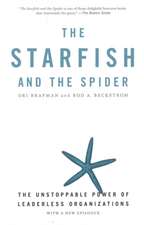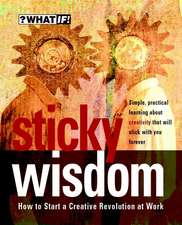Leadership in a Diverse and Multicultural Environment: Developing Awareness, Knowledge, and Skills
Autor Mary L. Connerley, Paul B. Pedersenen Limba Engleză Paperback – 25 mai 2005
Preț: 837.65 lei
Preț vechi: 1021.52 lei
-18% Nou
160.28€ • 167.82$ • 132.94£
Carte tipărită la comandă
Livrare economică 10-24 aprilie
Specificații
ISBN-10: 0761988602
Pagini: 232
Dimensiuni: 152 x 229 x 12 mm
Greutate: 0.32 kg
Ediția:New.
Editura: SAGE Publications
Colecția Sage Publications, Inc
Locul publicării:Thousand Oaks, United States
Cuprins
Multiculturalism and Diversity
Multiculturalism is Inclusive and Broadly Defined
The Need for Multicultural Skills
International Perspectives on Managing Diversity
Value Added from Multiculturalism and Diversity
Why Focus on Leaders?
Conclusion
Critical Incident: Culture and Performance Feedback
Exercise 1: Coalitions and Trust Formation
Chapter 2: The Complexity of Culture
Cultural Similarities and Differences
A Test of Reasonable Opposites
One Size Does Not Fit All
The Multicultural Perspective Has An Up Side
Culture is Complex and not Simple
Culture Balance is Dynamic and not Static
The Dangers of Ignoring Culture
White Privilege is Real
Conclusion
Critical Incident: Is it White Privilege?
Exercise 2: A Test of Reasonable Opposites
Chapter 3: Cultural Frameworks and Their Importance for Leaders
Leaders and Culture
Seminal Work on Culture
Additional Important Research Related to Culture
GLOBE Research
Culture and Context
Developing Intercultural Sensitivity
Cognitive, Affective, and Behavioral Components
A Three-Stage Developmental Sequence
Conclusion
Critical Incident: Whose Holiday is it Anyway?
Exercise 3: Describing Cultural Identity
Chapter 4: Where Does One Start in the Journey for Multicultural Awareness, Knowledge, and Skills?
Ethnic Identity Models
Racial Identity Models
Implications of Identity Models for Leaders
Different Types of Intelligence
Kolb's Learning Styles
Gagne's Theory of Instruction
Conclusion
Critical Incident: A Celebration of Cultural Picnic
Exercise 4: Interpreting Policy on a Cultural Context
Chapter 5: The Development of Multicultural Competencies
Global Leadership Competencies
The Multidimensional Model for Developing Cultural Competence
Dimension 1: Race- and Culture-Specific Attributes of Competence
Dimension 2: Components of Cultural Competence
Dimension 3: The Foci of Cultural Competence
Conclusion
Critical Incident: I Had Them Right Where I Wanted Them…I Thought
Exercise 5: Double-Loop Thinking
Chapter 6: What Can We Do to Make Multicultural and Diversity Training More Effective?
Needs Assessment
Transfer of Training
The Evolution of Diversity Training
Problems with Diversity Training
Conclusion
Critical Incident: With the Best of Intentions
Exercise 6: A Self Assessment of Multicultural Awareness, Knowledge and Skill
Chapter 7: A Training Program to Lead from Multicultural Awareness to Knowledge and Skills
Establishing the Objectives for Multicultural Awareness, Knowledge, and Skills
Design Techniques
Training Approaches
Evaluation
Critical Incident: Flavor of the Month Diversity Training
Exercise 7: Predicting the Decisions of a Resource Person
Chapter 8: Constructive Conflict Management in a Cultural Context
A General Model for Handling Conflict
A Culture-Centered Perspective
Western and Non-Western Alternative Models
Conflict in an Asian-Pacific Context
Constructive Conflict Management in the 21st Century
Conclusion
Critical Incident: What Type of Conflict is This?
Exercise 8: The Cultural Grid
Chapter 9: Redesigning Leadership through Multiculturalism
Leadership Styles and Multiculturalism
Examining Mentoring through a Multicultural Lens
Ethical Dimensions of Multiculturalism
Culture's Influence on Negotiation Styles
Conclusion
Critical Incident: Ethics Across Cultures
Exercise 9: Four Contrasting Ethical Orientations
Appendix: A Synthetic Culture Training Laboratory
Notă biografică
Mary Connerley is Associate Professor, Department of Management, Pamplin College of Business,Virginia Polytechnic Institute and State University. Before coming to Virginia Tech, Dr. Connerley worked for five years with the Executive Development Program at the University of Iowa where her responsibilities included evaluating the entire program for thoroughness and continuity and serving as liaison between executives and faculty. Dr. Connerley has taught courses at the undergraduate, MBA, and doctoral levels, including Principles of Management, Human Resource Management, Staffing, Training and Development, and Managing Diversity in the Workplace. She has also been involved as a Management and Professional Development Program Facilitator. Her most recent programs have dealt with acquiring and keeping good employees and managing a multi-generational workforce.
Dr. Connerley has been an active researcher and has published articles in journals such as Personnel Psychology, Journal of Occupational and Organizational Psychology, Human Relations, as well as others. Her current research interests include various aspects of the staffing process, performance evaluation, and diversity. Honors for Dr. Connerley include being selected as a Multicultural Fellow at Virginia Tech, receiving a Pamplin College of Business Teaching Excellence Award, and receiving two Citations of Excellence for her research.
